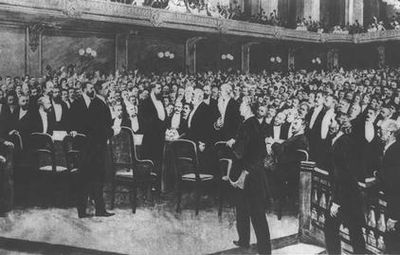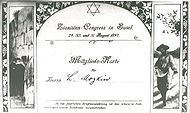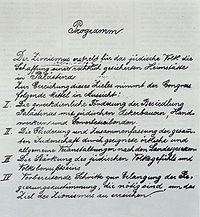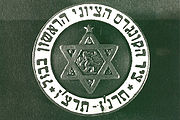
First Zionist Congress
Encyclopedia

Congress
A congress is a formal meeting of the representatives of different nations, constituent states, independent organizations , or groups....
of the Zionist Organization (ZO) (to become the World Zionist Organization (WZO)
World Zionist Organization
The World Zionist Organization , or WZO, was founded as the Zionist Organization , or ZO, in 1897 at the First Zionist Congress, held from August 29 to August 31 in Basel, Switzerland...
in 1960) held in Basel (Basle)
Basel
Basel or Basle In the national languages of Switzerland the city is also known as Bâle , Basilea and Basilea is Switzerland's third most populous city with about 166,000 inhabitants. Located where the Swiss, French and German borders meet, Basel also has suburbs in France and Germany...
, Switzerland
Switzerland
Switzerland name of one of the Swiss cantons. ; ; ; or ), in its full name the Swiss Confederation , is a federal republic consisting of 26 cantons, with Bern as the seat of the federal authorities. The country is situated in Western Europe,Or Central Europe depending on the definition....
, from August 29 to August 31, 1897. It was convened and chaired by Theodor Herzl
Theodor Herzl
Theodor Herzl , born Benjamin Ze’ev Herzl was an Ashkenazi Jew Austro-Hungarian journalist and the father of modern political Zionism and in effect the State of Israel.-Early life:...
, the founder of the modern Zionism movement. The Congress formulated a Zionist platform, known as the Basel program, and founded the Zionist Organization. It also adopted the Hatikvah
Hatikvah
"Hatikvah" is the national anthem of Israel. The anthem was written by Naphtali Herz Imber, a secular Galician Jew from Zolochiv , who moved to the Land of Israel in the early 1880s....
as its anthem (already the anthem of Hovevei Zion
Hovevei Zion
Hovevei Zion , also known as Hibbat Zion , refers to organizations that are now considered the forerunners and foundation-builders of modern Zionism....
and later to become the national anthem
National anthem
A national anthem is a generally patriotic musical composition that evokes and eulogizes the history, traditions and struggles of its people, recognized either by a nation's government as the official national song, or by convention through use by the people.- History :Anthems rose to prominence...
of the State of Israel
Israel
The State of Israel is a parliamentary republic located in the Middle East, along the eastern shore of the Mediterranean Sea...
).
Origins
_(1897).jpg)
Theodor Herzl
Theodor Herzl , born Benjamin Ze’ev Herzl was an Ashkenazi Jew Austro-Hungarian journalist and the father of modern political Zionism and in effect the State of Israel.-Early life:...
as a symbolic parliament for the small minority of Jewry in agreement with the implementation of Zionist
Zionism
Zionism is a Jewish political movement that, in its broadest sense, has supported the self-determination of the Jewish people in a sovereign Jewish national homeland. Since the establishment of the State of Israel, the Zionist movement continues primarily to advocate on behalf of the Jewish state...
goals. While Jewish majority opposition to Zionism would continue until after revelation of the Holocaust in WWII, some proponents point to several directions and streams of this early Jewish opposition. Typical of this, the Congress, which was originally planned in Munich
Munich
Munich The city's motto is "" . Before 2006, it was "Weltstadt mit Herz" . Its native name, , is derived from the Old High German Munichen, meaning "by the monks' place". The city's name derives from the monks of the Benedictine order who founded the city; hence the monk depicted on the city's coat...
, Germany
Germany
Germany , officially the Federal Republic of Germany , is a federal parliamentary republic in Europe. The country consists of 16 states while the capital and largest city is Berlin. Germany covers an area of 357,021 km2 and has a largely temperate seasonal climate...
, was transferred to Basel by Herzl, because of vocal opposition by both the Orthodox and Reform community leadership. The Congress took place in the concert hall of the Basel Municipal Casino on August 29, 1897.
Congress

Following a festive opening in which the representatives arrived in formal dress, tails
Tailcoat
A tailcoat is a coat with the front of the skirt cut away, so as to leave only the rear section of the skirt, known as the tails. The historical reason coats were cut this way was to make it easier for the wearer to ride a horse, but over the years tailcoats of varying types have evolved into forms...
and white tie
White tie
White tie is the most formal evening dress code in Western fashion. It is worn to ceremonial occasions such as state dinners in some countries, as well as to very formal balls and evening weddings...
, the Congress moved onto the agenda. The principal items on the agenda were the presentation of Herzl's plans, the establishment of the Zionist Organization and the declaration of Zionism's goals-the Basel program.
At the Congress, Herzl was elected President of the Zionist Organization, with Max Nordau
Max Nordau
Max Simon Nordau , born Simon Maximilian Südfeld in Pest, Hungary, was a Zionist leader, physician, author, and social critic....
and Moses Gaster
Moses Gaster
Moses Gaster was a Romanian-born Jewish-British scholar, the Hakham of the Spanish and Portuguese congregation, London, and a Hebrew linguist. He was also the son-in-law of Michael Friedländer, principal of Jews' College. The surname Gaster is taken from Spanish Castro, indicating his Sephardic...
two of the three vice-presidents. Also, an Inner Actions Committee and a Greater Actions Committee were elected to run the affairs of the movement between Congresses.
Basel Declaration

Max Nordau
Max Simon Nordau , born Simon Maximilian Südfeld in Pest, Hungary, was a Zionist leader, physician, author, and social critic....
, it was stated: "Zionism
Zionism
Zionism is a Jewish political movement that, in its broadest sense, has supported the self-determination of the Jewish people in a sovereign Jewish national homeland. Since the establishment of the State of Israel, the Zionist movement continues primarily to advocate on behalf of the Jewish state...
seeks to establish a home for the Jewish people in Palestine
Palestine
Palestine is a conventional name, among others, used to describe the geographic region between the Mediterranean Sea and the Jordan River, and various adjoining lands....
secured under public law." This gave clear expression to Herzl's political Zionist vision, in contrast with the settlement orientated activities of the more loosely organized Hovevei Zion
Hovevei Zion
Hovevei Zion , also known as Hibbat Zion , refers to organizations that are now considered the forerunners and foundation-builders of modern Zionism....
. To meet halfway the request of numerous delegates, the most prominent of whom was Leo Motzkin
Leo Motzkin
Leo Motzkin was a Russian Zionist leader. A leader of the World Zionist Congress and numerous Jewish and Zionist organizations, Motzkin was a key organizer of the Jewish delegation to the 1919 Paris Peace Conference and one of the first Jewish leaders to organize opposition to the Nazi Party in...
, who sought the inclusion of the phrase "by international law," a compromise formula proposed by Herzl was eventually adopted.
The program, which came to be known as the Basel program, set out the goals of the Zionist movement. It was adopted on the following terms:
Aftermath

- The formulation of the Zionist platform, (the Basel program, above)
- The foundation of the Zionist OrganizationWorld Zionist OrganizationThe World Zionist Organization , or WZO, was founded as the Zionist Organization , or ZO, in 1897 at the First Zionist Congress, held from August 29 to August 31 in Basel, Switzerland...
- The adoption of HatikvahHatikvah"Hatikvah" is the national anthem of Israel. The anthem was written by Naphtali Herz Imber, a secular Galician Jew from Zolochiv , who moved to the Land of Israel in the early 1880s....
as its anthem - The absorption of most of the previous Hovevei ZionHovevei ZionHovevei Zion , also known as Hibbat Zion , refers to organizations that are now considered the forerunners and foundation-builders of modern Zionism....
societies - The suggestion for the establishment of a people's bank, and
- The election of Herzl as President of the Zionist Organization and Max NordauMax NordauMax Simon Nordau , born Simon Maximilian Südfeld in Pest, Hungary, was a Zionist leader, physician, author, and social critic....
one of three Vice-Presidents.
Theodor Herzl
Theodor Herzl
Theodor Herzl , born Benjamin Ze’ev Herzl was an Ashkenazi Jew Austro-Hungarian journalist and the father of modern political Zionism and in effect the State of Israel.-Early life:...
wrote in his diary (September 1, 1897):
Subsequent years
Subsequent congresses founded various institutions for the promotion of this program, notably a people's bank known as the Jewish Colonial Trust, which was the financial instrument of political Zionism. Its establishment was suggested at the First Zionist Congress in 1897; the first definite steps toward its institution were taken at the Second Zionist Congress in CologneCologne
Cologne is Germany's fourth-largest city , and is the largest city both in the Germany Federal State of North Rhine-Westphalia and within the Rhine-Ruhr Metropolitan Area, one of the major European metropolitan areas with more than ten million inhabitants.Cologne is located on both sides of the...
, Germany
Germany
Germany , officially the Federal Republic of Germany , is a federal parliamentary republic in Europe. The country consists of 16 states while the capital and largest city is Berlin. Germany covers an area of 357,021 km2 and has a largely temperate seasonal climate...
in May, 1898. For the Fifth Zionist Congress, the Jewish National Fund
Jewish National Fund
The Jewish National Fund was founded in 1901 to buy and develop land in Ottoman Palestine for Jewish settlement. The JNF is a quasi-governmental, non-profit organisation...
was founded for the purchase of land in the Land of Israel and later the Zionist Commission
Zionist Commission
The Zionist Commission for Palestine was a group chaired by Chaim Weizmann, president of the British Zionist Federation following British promulgation of the pro-Zionist, Balfour Declaration of 1917. The Commission was formed in March 1918 and went to Palestine to study conditions and make their...
was founded with subsidiary societies for the study and improvement of the social and economic condition of the Jews within the Land of Israel.
The Zionist Commission was an informal group established by Chaim Weizmann. It carried out initial surveys of Palestine and aided the repatriation of Jews sent into exile by the Ottoman Turks during World War I. It expanded the ZO's Palestine office, which was established in 1907, into small departments for agriculture, settlement, education, land, finance, immigration, and statistics. In 1921, the commission became the Palestine Zionist Executive, which acted as the Jewish Agency, to advise the British mandate authorities on the development of the country in matters of Jewish interest.
The Zionist Congress met every year between 1897 and 1901, then except for war years, every second year (1903-1913, 1921-1939). In 1942, an “Extraordinary Zionist Conference
Biltmore Conference
The Biltmore Conference, also known by its resolution as the Biltmore Program, was a fundamental departure from traditional Zionist policy with its demand "that Palestine be established as a Jewish Commonwealth." The meeting was held in New York City at the prestigious Biltmore Hotel from May 6...
” was held and announced a fundamental departure from traditional Zionist policy with its demand "that Palestine be established as a Jewish Commonwealth." It became the official Zionist stand on the ultimate aim of the movement. Since the Second World War, meetings have been held approximately every four years and since the creation of the State of Israel
Israel
The State of Israel is a parliamentary republic located in the Middle East, along the eastern shore of the Mediterranean Sea...
, the Congress has been held in Jerusalem. In 2002, the Green Zionist Alliance
Green Zionist Alliance
The Green Zionist Alliance is a New York-based secular and pluralistic Jewish environmental organization that is a U.S.-registered 501 tax-deductible nonprofit charity...
became the first environmental organization to ever hold a seat at the World Zionist Congress.

